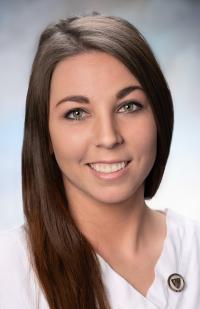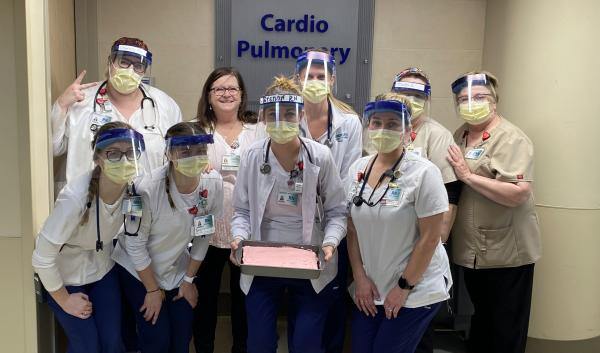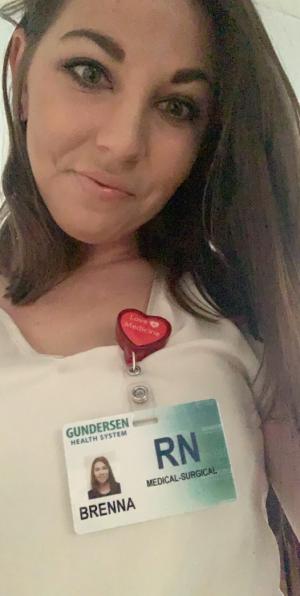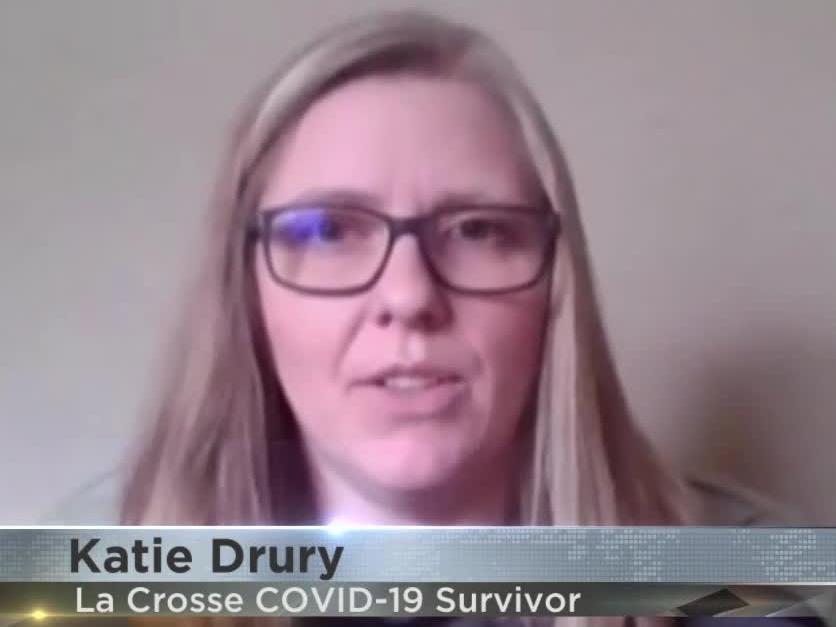Last spring, when the COVID-19 pandemic was raging in New York City, Brenna Grotegut '19 signed up for a 13-week stint as a traveling nurse to be assigned to Bellevue Hospital in Manhattan, a hospital that was considered “COVID ground zero” in New York City. Grotegut, who graduated with a bachelor’s degree in nursing from Viterbo University in May 2019, had to quit her job at Gundersen Health System in La Crosse to take the job, with no guarantee she would get her job back when she returned from New York.
Even with the uncertainty about her employment future and the warning that she would have patients dying of COVID-19 every 35 to 40 minutes, Grotegut went ahead with the New York deployment.
“It’s the right thing to do. I’m going to come back a better nurse than when I left,” she said, days before she was scheduled to leave for New York. “It’s going to be the worst thing I ever see, but the best thing I ever do. This is going to be a big adventure.”
At the last minute, however, with New York’s COVID-19 case counts on the decline, she was reassigned to a new hot spot: Detroit.
Grotegut has finished her work in Detroit and is back at Gundersen’s cardiopulmonary unit. She wrote the following account of her time battling COVID-19 in Detroit and the soul searching she did in the aftermath of her work there.
On the Front Lines: Health Care Soldiering in the COVID-19 War
By BRENNA GROTEGUT '19
I am finally back at Gundersen and beginning to settle back into my life pre-Detroit but with a greater appreciation. One thing is for sure: there is nursing pre-COVID-19 and now, after COVID-19 has hit and affected our lives. I’m sure that is not just for nurses but for everyone.
My time in Detroit is very hard to put into words. I felt like a health care soldier. I went to work every day ready for a big battle, 12 hours in the making, and when it came to working on the COVID-19 unit, it was not about a passion or a love for what I do. It was 100% in the service of others and the feeling like you have a particular set of skills—that and a mental and physical toughness to do what was needed.
I can honestly say my feet never hurt as bad as when I went out those doors at the end of a shift. I don't know if it's the architecture of the hospital I was in or actually the pure weight of everything.
Each day was an emotional rollercoaster, driving 30 minutes in five-lane traffic, psyching myself up for the battle the day would bring, to the joy of working and chatting with people and nurses from everywhere, to the "shit" moment when a code light comes on, signaling a patient needs heroic lifesaving measures and you make a sprint for it—a moment I would probably experience four more times that day.
Then there is the pure empathy for the family members as they would call in wanting an update about a loved one they haven't seen in days, weeks, months. Really, they want to hear about their improvement, wanting to hear words of encouragement and support from us. That was one of the hardest parts, trying to explain a disease process that we didn't even understand ourselves.
And then, just when you think you can't handle anything else, "Ain’t No Mountain High Enough" by Diana Ross would come on, which meant a COVID-19 patient was discharging to go home. It meant instant tears and a reminder of why I’m here brought to the forefront.
But then the shift would end and I'd drive home in five-lane traffic, sit in my hotel room, eat, and fall asleep within an hour, not being able to decompress or discuss the events of the day with anybody who experienced the same things. Even my nurse friends back home had no idea what was happening here.
The unit was overrun, the patient load each nurse had was unsafe, and my waking hours were consumed with sickness and death that you saw and just couldn't understand. But I did my time, I did what I could to help the people of Detroit, and I came home. I felt appreciated there, by the patients, the families, and the community. And while I was there, not one time did I hear "this is government conspiracy" or "the media is exaggerating." The people of Detroit understood this virus, were scared of this virus because everybody knew someone who had died from it.
I came home to negativity—negativity about the virus and about human rights; people throwing fits about having to wear masks and the constant doubt that it's real. When I got back home, I went and I got my hair done, some self-care—a maybe if I felt I looked good I would feel good sort of thing. I sat there as my good friend worked and we listened to another lady in the salon talk about how COVID-19 isn't real and how she refuses to wear a mask or abide by the guidelines. She went on and on.
My friend, knowing what I went through, of course asked if I was OK, and I said “yes.” But honestly, “no.” I had to go to Detroit and work as a travel nurse because their nurses were getting sick and being hospitalized due to a virus they were contracting while caring for others.
And that's when I began to doubt whether I wanted to be a nurse anymore. Why would I risk everything, my health and my happiness, for people who don't have the respect to wear a mask? That say they can't breathe in a cloth mask or a paper surgical mask, when in order for me to care for people I have to wear a mask so tight it leaves pressure injuries on my face—MY FACE—while wearing PPE that makes us sweat and super uncomfortable.
Then I realized that the disregard for each other went way further beyond COVID-19. The protests and fight for human rights was also happening, and I just didn't see the point in the service of others. I really didn't think I wanted to be a nurse anymore. You know, sometimes you're so deep in the forest that you can't see the trees.
So I started reading the American Nurses Association magazines that get sent to my house monthly, and it discussed this, the emotional toll COVID-19 has had on nurses. I started spending more time outside, riding my bike and going for hikes. And it was on one of my bike rides that a lady and her husband were walking the trails near La Crosse and the lady fell and screamed in pain. She was in front of me a ways, so I saw the whole thing.
I jumped off my bike and ran over to her to find a severely dislocated left wrist and a very distraught older woman and a worried husband. Instantly, I got straight to my skills and my experience, and I sat with the lady and helped her to breathe and remain calm for almost 45 minutes until police and EMTs arrived, and it was after that that I realized nursing isn't a career or a job, it's who I am and it's a part of me. Nobody and no virus can take that away.
Sometimes you just need perspective or something to pull you out of the trees so that you can see the forest for what it is. I'm back at Gundersen now, working on the same unit as before Detroit—cardiopulmonary—and I've never been happier to be back to that hospital, but mostly that unit with those people. I also have been working as a COVID-19 triage nurse for Riverside Corporate Wellness, which is teamed with the Wisconsin Department of Health to create a resource for the state to help answer questions, offer recommendations and help find testing sites.
During my time in Detroit, I lost 13 patients to COVID-19, ages 27-89. Some of them had no underlying health issues, while those who did had anything and everything. It was an experience that I will have with me the rest of my life and nursing career, and I am grateful for it.




